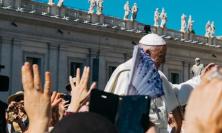The World Economic Forum in Davos begins today under the cloud of the IMF’s warning of the risks that the eurozone crisis poses to the global economy. With the integration of politics and economics receiving more attention than ever before, Brendan MacPartlin SJ describes the recommendations of a Vatican document published at the end of last year, in which the Pontifical Council for Justice and Peace outlined a vision for financial reform under the guidance of a new, global body.
530 million years ago, single-celled animals populated the earth. Then nature discovered a way to make more complex life forms and produced an explosion of new species in a relatively short time (like a few million years).
Today the earth is full of free individuals engaging in fair exchanges. 10% of them achieve success. The remaining 90% fall victim to the market. The world struggles with crises of finance and economy, poverty, food security, the environment, peace and security, arms control, human rights and the management of migratory flows. Where we aspired to millennium development, there is gross inequality. We need a better global system and we cannot wait a few million years to work it out by trial and error. It is time for intentional and intelligent evolution.
A document published last year by the Pontifical Council for Justice and Peace suggests that we are ‘in passage’ from a state of nature made up of rival kingdoms and nation states to a higher level system of international community. Towards Reforming the International Financial and Monetary Systems in the Context of a Global Public Authorityprescribes the revolutionary power of ‘forward-looking imagination’ as the way to perceive the possibilities inscribed in the present that will guide us towards a new future. In a short but dense document, that is encouraging and enlightening, it deploys the accumulated wisdom of social reflection in concepts and arguments that merit examination. Here I will attempt a summary account of the document – at the risk of attenuating the broadness of its vision and depth of its language – and its vision for the future.
‘An opportunity for discernment’
The current financial crisis stimulates us to re-examine the basis of social coexistence, to replan our journey, devise new rules and to commit to what G20 describes as ‘a new era of sustainable global economic activity grounded in responsibility’.[1] The crisis calls for answers that are not just sectorial and isolated, but systematic and integrated, rich in solidarity and subsidiarity and geared to the universal common good.
For the Church, the crisis is ‘an opportunity for discernment, in which to shape a new vision for the future’[2] and it proposes the global ‘common good’ as the framework for such a strategic vision. This implies a system in which all participate and to which all contribute, and from which each person or nation can draw to supplement its own efforts to achieve full development. The Church addresses its reflections to world leaders and people of good will; their respective trajectories meet on the shared ground of the search for the common good and the fulfilment of human person. People have made a ‘“monumental amount of individual and collective effort”...“throughout the course of the centuries ... to better the circumstances of their lives”’[3] and the Church’s reading is that God is in this. The Spirit is working in the minds and hearts of people who want to make a difference, as much as, in fact more than, in the working of the stars or the evolution of the cosmos. If we labour in turmoil it is with a sure hope.
Diagnosis of the crisis
The removal of legal controls on capital movements together with an increased ability of information and communication technology to move capital led to rapid growth in international exchange. The lack of international rules and the tendency towards the deregulation of banking and financial activities added anarchy to the money market. There was a growing tendency to define the strategic directions of economic and financial policy in terms of the ‘clubs’ and ‘groups’ of more developed countries; the less developed or emerging countries were not represented in this process. ‘Casino capitalism’ brought investment and growth to some areas, leaving others in hunger and poverty. Monetary and financial activities worldwide grew much more rapidly than the production of goods and services. The quality of credit deteriorated and exposed the credit institutions to more risk than was reasonably sustainable.
Market failure triggered the financial crisis. There was an excessive supply of money, a plethora of financial instruments and a speculative bubble in construction. A liberalist approach assumed that letting Lehman Brothers go bankrupt would satisfy the market but instead confidence was undermined, attitudes changed and public intervention was required to stem the crisis. The failed approach assumed that what is useful for the individual leads to the collective good of the community; it led instead to payment by the community for the debts of those who cared only for their private utility.
Very much associated with this is a technocratic approach to the creation of wealth which assumes that the issue is merely technical. But many have argued that there is a broader cause of the crisis, an ethical one, specifically the principle that greed is effective in the market. With the benefit of hindsight we now know that we need an evidence-based, intelligent and intentional evolution of an integrated system of market management to replace the liberalist doctrine of market freedom.
Moving forward – what can the Church offer?
Such evolution requires a fuller analysis of the way forward, one that will embed the financial and economic in the political and, in turn, the political in the cultural and ethical. Equally necessary is the recognition that decision-making should be grounded in ethics, not technical requirements, and that solidarity is the context that should animate the core of globalising action. The Church’s particular competence in integrated decision-making lies in the aspect of discernment, that is, sensitivity to the prompting of the Spirit, even at the economic and political levels.
There is also the question of the most appropriate level for decision-making – local, national, regional or global. Communities, nation states and federations each have a right to determine their own destiny according to their own capacity, but at the limits of their capacities they need help from the level above. For example, homesteads in rural communities take care of their own water supply, but in urbanised communities it is appropriate that a local council should arrange to provide the water supply. Similarly, individual nation states need the help of an emerging global system to deal with many issues such as the environment, international financial stability, drug control and so on. The Church again has a valuable tool to contribute to this task, in the principle of subsidiarity which holds a prominent place in Catholic Social Teaching.
Towards the Common Good
Through globalisation the world is heading towards greater unification, but the Bretton Woods institutions are no longer able to regulate the money supply, nor monitor the taking on of credit risk. Nor are they able to ensure the universal public good of stable world finance. We need to create a world authority that can ensure collective public goods. Otherwise the rules and outcomes will be dictated by the balance of power among the strongest nations.
What does such a public authority look like? It should be the outcome of a free and shared agreement that reflects the permanent and historic needs of the world common good. Its purpose is to serve that common good. Therefore, it needs structures and mechanisms adequate to its mission and the expectations placed on it. It should be favourable to the existence of effective monetary and financial systems that are overseen by suitable legal frameworks. Such frameworks should support sustainable development and the social progress of all. The Authority must have a global reach but not one imposed by force, coercion or violence.
How can an authority with universal jurisdiction be established? This is complex and delicate, and it should be a long, gradual process. It ought to arise from growth in achieving freedoms and recognising responsibility. It should be preceded by a preliminary phase of consultation from which a legitimated institution will emerge that is in a position to be an effective guide and, at the same time, can allow each country to express and pursue its own particular good. Reciprocal trust, autonomy and participation are essential elements. The consent should involve the commitment of an ever greater number of countries brought about through a sincere dialogue that values, rather than marginalises, minority opinions.
What shape would the process take? In the first stages it would make use of pre-existing examples of horizontal coordination, which can be said to constitute governance. Bodies like the World Trade Organisation negotiate multilateral trade agreements that bring the benefits of trade to many. Other forms of multilateral functioning have also appeared, such as interdependence and cooperation at the political level, as well as programmes for sustainable development and peace. The document cites the United Nations as a template for a new, global authority. At later stages, vertical coordination will be added to horizontal coordination. This is more like government. An authority that is above partiality should make its decisions in the interests of all and not only to the advantage of more powerful countries. It should involve all peoples in contributing to a continued collaboration and moral dialogue, to which they bring the heritage of their virtues and their civilizations. It should serve the governments that are its members and respect their democratic legitimacy rather than seek their unconditional service. It should respect the freedom of people, individually and in communities, and allow them to take responsibility for their own objectives and duties; according to the principle of subsidiarity it should at the same time provide ‘subsidium’, that is, help, when they cannot manage by themselves. It should for instance create the socio-economic, political and legal conditions essential for the existence of markets that are effective and not over-protected by paternalistic national policies nor weakened by systematic deficits in public finances and gross national product. Subsidiarity that is articulated into several layers involves many levels that can work together and avoids the bureaucratic isolation and delegitimisation of the central authority. Policy priorities should include global social justice that avoids harm to the weakest countries and achieves a fair distribution of world wealth.
Reforming the International Monetary System
The document also makes specific recommendations for the global economic framework. In order to re-embed financial and monetary policy in the real economy we need a minimum, shared body of rules. G20 proposes ‘to reform the global architecture to meet the needs of the 21st century’ and ‘launch a framework that lays out the policies and the way we act together to generate strong, sustainable and balanced global growth’.[4] Specific attention should be paid to the reform of the international monetary system and, in particular, the commitment to create some form of global monetary management, something that is already implicit in the Statutes of the International Monetary Fund.
The Pontifical Council for Justice and Peace also argues for taxation measures on financial transactions as being very useful in promoting global development and sustainability according to the principles of social justice and solidarity. Such taxes could also contribute to the creation of a world reserve fund to support the economies of the countries hit by crisis. Other tasks include recapitalisation of banks with public funds conditional on virtuous behaviours aimed at developing the ‘real economy’. There is a need also to define the domains of ordinary credit and of investment banking and thus allow a more effective management of the ‘shadow markets’ which have no controls and limits.
Biblical models
Reference to a world authority is the only horizon compatible with the needs of humankind in the context of the new realities of a world on its way to rapid globalisation. However, given wounded human nature, world leadership will not come about without anguish and suffering. The image of the tower of Babel warns us of how an apparent unity can collapse under the ‘diversity’ of peoples where shared understanding and commitment have not been consolidated. The model of Pentecost encourages us with the spirit of concord that rises above antagonisms and division. The Church gives witness to that Spirit’s action in the world. With his/her help we can build a new integration, no longer with anxiety but in hope and solidarity and provide a meaningful future for the generations to come.
Brendan MacPartlin SJ directs the Migrant Support Service of the charity, Dialogue for Diversity in Northern Ireland.
[1] G20 Leaders’ Statement, Pittsburgh Summit, 2009, quoted in Towards Reforming the International Financial and Monetary Systems in the Context of a Global Public Authority
[2] Pope Benedict XVI, Caritas in Veritate, §21
[3] Towards Reforming the International Financial and Monetary Systems in the Context of a Global Public Authority, quoting Gaudium et Spes §34
[4] G20 Leaders’ Statement, Pittsburgh Summit, 2009.






